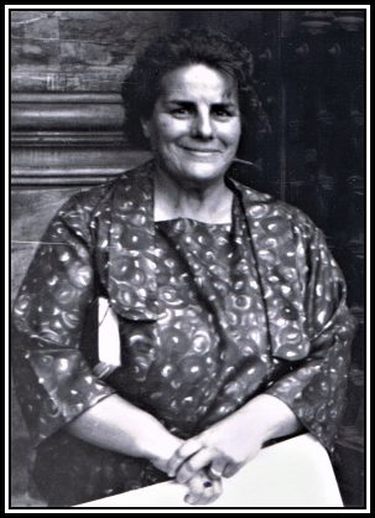TALES OF MY PARENTS
-oOo-

-oOo-
TALES OF MY MOTHER
 My Mother at The Vatican, 1966
My Mother at The Vatican, 1966
-oOo-
TALE 7a: MY MOTHER’S WAR YEARS
-oOo-
My mother worked for British Railways during the Second World War. This period of her life has been presented elsewhere at eastend-end-memories.org in the stories, Women at War and The Miracle in Homerton. These tales reveal how difficult my mother’s life was during this time. Adding to her difficulties was the fact that I was unable to tolerate spending time in the public shelters that had been built throughout London for the safety of the populace during air raids. For some unknown reason, when I was taken to the shelter, I began to scream, and did so constantly until the raid ended. My behaviour did not sit well with the others in the shelter. As a result, my mother took to remaining in the house where she rented two small rooms and sitting, with me in her arms, under the stairs. Of course, I screamed constantly here too, but I did not disturb anyone, but my poor mother.
The shelter was not kind to me, as I constantly caught illnesses while cooped-up there. In addition, I had to suffer a Day Nursery each day while my mother rolled around The Docks and The City of London with the horses, Daisy and Elsie, making their deliveries. Naturally I caught every cold available here too!
And so, I suppose, it was to be expected that eventualy I would catch something serious since both Day Nurseries and shelters were, medically speaking, dangerous places! I caught both Bronchial Pneumonia and Whooping Cough, each a deadly disease at this time. Once I showed the signs and symptoms of a serious ailment, my condition quickly worsened and our local doctor had me admitted to Homerton Hospital for treatment. During this time, my mother had to continue her delivery work for British Railways and take her turn as a Fire Watcher in our neighbourhood.
-oOo-
Patient visiting hours at this time were not as they are today. Nowadays visitors are able to come and go pretty much as they please during most of the day, often to the chagrin of the hospital staff. However, when I was a child, visitors were allowed access to their loved-ones for about half-an-hour in the early evening and that was all. My mother spent most of her time when not working sitting in the central garden of the hospital. Since the hospital was not far from the London Docks, a favourite target of the Luftwaffe, bombs were often dropped close by thereby endangering my mother, the hospital and its staff.
-oOo-
My medical condition continued to deteriorate following my admission to Homerton Hospital and eventually became grave. The seriousness of my condition apparently prompted the hospital authorities to contact the military and suggested that they bring my father home as soon as possible. At this time my father was somewhere in Germany along with thousands of others pushing towards Berlin. Once his command was contacted, he was given compassionate leave and immediately flown home. While my mother waited, my condition was thought serious enough for me to be given The Last Rites of the Church and it was generally believed, except by my mother, that I would be dead before he arrived.
-oOo-
The Crimean War (1853-1856) is generally considered to be one of the first of the Modern Wars in that it allowed both new technologies and the application of new ways to old technologies to be tested in combat. Although advances in wound-care, as pioneered among the British Army by the nurses, Florence Nightingale (1820-1920) and Mary Seacole (1805-1881), the majority of deaths from this conflict, and those prior to it, were from disease and the infection of wounds: of the British loss of ~21,000, ~2,800 were killed in action, ~2,000 died from their wounds and ~16,000 from disease. The losses suffered by the French, Ottoman and Russian troops were even greater.
It is estimated that a total of eleven million military personnel and about seven million civilians died during the First World War. Of these losses, it is believed that two million people died from disease.
-oOo-
As the Second World War progressed, it soon became obvious to the authorities that a greater number of service men and women were dying from disease and wound infection than on the battlefield. What antibiotics that were available were not especially effective in combating the bacteria that infected the wounds. Seemingly this prompted the authorities to re-examine previously thought useless avenues of research in the hope that a wonder drug might be uncovered that could spearhead their treatment plan. The exploration of one such avenue of investigation eventually led to the re-discovery of Penicillin.
-oOo-
Sir Alexander Fleming (1881–1955) said that the date of his discovery of Penicillin was on the 28th September, 1928 and stated that this occurred by pure accident. While working in his laboratory in the basement of St. Mary’s Hospital in London, he noticed a Petri Dish containing the bacterium, Staphylococcus, which had been mistakenly left open and had become contaminated by a Blue-Green Mould. He observed a Halo of inhibited bacterial growth around the Mould and went on to conclude that it had released a substance that repressed the growth and caused lysing of the bacteria.
Fleming published his findings in 1929, however little attention was paid to his article. He identified the Mould as belonging to the Penicillium genus, and, later named the active substance it released Penicillin. His additional investigations revealed that the Penicillium Mould was difficult to grow and that the active agent (i.e. Antibiotic) was also difficult to isolate. As a result, he concluded that Penicillin would not be of importance in the treatment of infections, and by 1940, he had abandoned his studies on Penicillin.
Soon after, both the British and U.S. Governments evidently realised the potential value of Penicillin in the treatment of infection and began funding studies by Howard Florey (1898-1968) and Ernst Boris Chain (1906-1979) at the Radcliffe Infirmary in Oxford into its mass-production. By 1941, this became a reality, and by D-Day, sufficient Penicillin had been produced to treat all the wounded of the Second World War.
As a result of their contribution to medicine and the successful treatment of many, Fleming, Florey and Chain received many awards and accolades. In 1945, they were jointly awarded the Nobel Prize in Medicine. All three researchers were elected to Fellowship of the Royal Society and eventually each was knighted: Fleming and Florey in 1944 and Chain in 1969. In 1999, Time Magazine named Fleming as one of The Hundred Most Important People of the 20th Century, and stated that Penicillin was a discovery that would change the course of history.
With the discovery of Penicillin, a new age in the medical treatment became possible and which led to the production of a great many antibiotics to combat a wide variety of maladies.
-oOo-
By mid-1944, Penicillin was now being produced on a large scale in preparation for the Allied push across Europe and elsewhere and its subsequent need. Although Penicillin did not become readily available to the civilian population until after the war, fortunately the doctors at Homerton Hospital were able to get hold of a few units of it and administered it to me. And so, I became one of the first civilians to be treated with the world’s wonder drug and was dragged back from the abyss.
-oOo-
There were many rumours circulating during the Second World War regarding the state of health of Winston Churchill (1874-1965). My mother always believed that he had been given Penicillin at the same time as me and that it had saved his life too. It was only with the writing of this tale that I learned that although Churchill had been seriously ill during the early part of the war, he had not been treated with Penicillin, but with a Sulphonamide Drug. It is of note that the life of President Franklin Delano Roosevelt (1882-1945) had also been save by this same drug.
-oOo-
Although my mother was certainly very grateful to my being treated with Penicillin and believes that it played a significant role in my overcoming my illness(es), if truth be told, she actually believed that some other force had brought about my miraculous recovery!
As I said, my father was given compassionate leave and flown home from somewhere in Germany. My mother, in great dramatic fashion, used to tell that as soon as my father stepped into the room where I was being cared for, I opened my eyes and looked directly at him. I was then said to have smiled and, as I did, my fever broke!
My poor mother also added that although she had sat in the central garden of the hospital (with bombs dropping all around), where she had sat and prayed, I had virtually ignored her presence and only got well once my father arrived! Certainly my poor mother was happy that I had survived this ordeal, but I cannot but think that she was perhaps a tad miffed that my recovery had coincided with the exact moment of my father’s arrival.
-oOo-
I have always enjoyed the telling and retelling of how I survived these illnesses. I would have my mother tell the tale often in my father’s presence when I was young. The retelling never failed to cause me to break into great gales of laughter when my mother came to the end and gave my father one of her special dark looks! My father, always ready to take credit for some action, would smile and give us a look that told us that he believed, unequivocally, that he had been totally and utterly responsible for my recovery!
Whether my cure was due entirely to Penicillin or my father’s arrival or a combination of both, be that as it may, my mother (and me) believed that A Miracle had happened in Homerton! And who is to say that it hadn’t?
——-oooOooo——-

Pierre Salomon
pierrejsalomon@gmail.com
174.110.4.13
That is a great story Charles. I got to know about you and learned a little more about penicillin. I read how penicillin had gotten discovered but it is interesting to know you were a few of the individuals that were treated from the drug.